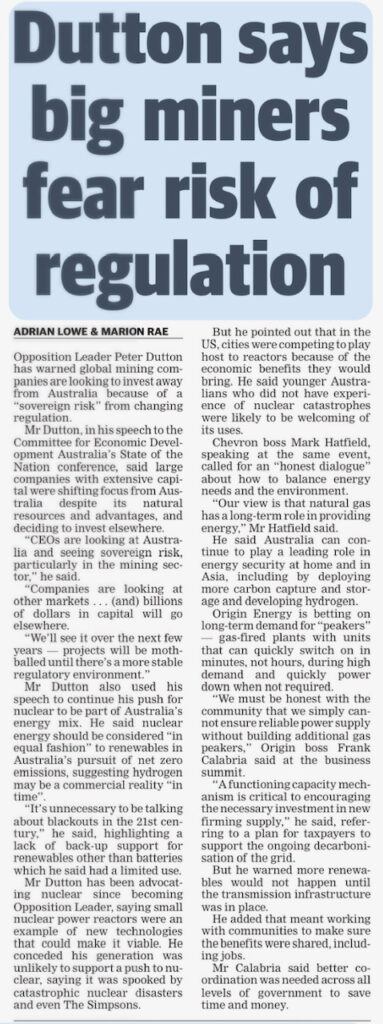
Article by Adrian Lowe & Marion Rae courtesy of the West Australian.

Opposition Leader Peter Dutton has warned global mining companies are looking to invest away from Australia because of a “sovereign risk” from changing regulation.
Mr Dutton, in his speech to the Committee for Economic Development Australia’s State of the Nation conference, said large companies with extensive capital were shifting focus from Australia despite its natural resources and advantages, and deciding to invest elsewhere.
“CEOs are looking at Australia and seeing sovereign risk, particularly in the mining sector ,” he said.
“Companies are looking at other markets . . . (and) billions of dollars in capital will go elsewhere.
“We’ll see it over the next few years — projects will be mothballed until there’s a more stable regulatory environment.”
Mr Dutton also used his speech to continue his push for nuclear to be part of Australia’s energy mix. He said nuclear energy should be considered “in equal fashion” to renewables in Australia’s pursuit of net zero emissions, suggesting hydrogen may be a commercial reality “in time” .
“It’s unnecessary to be talking about blackouts in the 21st century ,” he said, highlighting a lack of back-up support for renewables other than batteries which he said had a limited use. Mr Dutton has been advocating nuclear since becoming Opposition Leader, saying small nuclear power reactors were an example of new technologies that could make it viable.
He conceded his generation was unlikely to support a push to nuclear , saying it was spooked by catastrophic nuclear disasters and even The Simpsons.
But he pointed out that in the US, cities were competing to play host to reactors because of the economic benefits they would bring.
He said younger Australians who did not have experience of nuclear catastrophes were likely to be welcoming of its uses.
Chevron boss Mark Hatfield, speaking at the same event, called for an “honest dialogue” about how to balance energy needs and the environment.
“Our view is that natural gas has a long-term role in providing energy,” Mr Hatfield said.
He said Australia can continue to play a leading role in energy security at home and in Asia, including by deploying more carbon capture and storage and developing hydrogen.
Origin Energy is betting on long-term demand for “peakers” — gas-fired plants with units that can quickly switch on in minutes, not hours, during high demand and quickly power down when not required.
“We must be honest with the community that we simply cannot ensure reliable power supply without building additional gas peakers,” Origin boss Frank Calabria said at the business summit.
“A functioning capacity mechanism is critical to encouraging the necessary investment in new firming supply,” he said, referring to a plan for taxpayers to support the ongoing decarbonisation of the grid.
But he warned more renewables would not happen until the transmission infrastructure was in place.
He added that meant working with communities to make sure the benefits were shared, including jobs. Mr Calabria said better coordination was needed across all levels of government to save time and money.